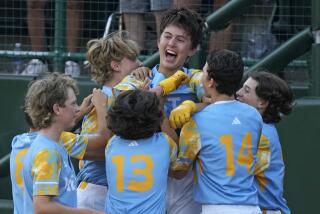Baseball falters in Puerto Rico
- Share via
SAN JUAN, Puerto Rico -- Enter Eduardo Figueroa’s Mexican restaurant in Old San Juan and the first thing you notice are New York Yankees pinstripes, the ones the former 20-game winner wore during his eight-year big league career, encased in glass as if they were pages from the Magna Carta.
And come to think of it, they might as well be. Because while baseball hasn’t yet become a museum relic on the island, the sport has suffered from such a decline in popularity in recent years, many young Puerto Ricans now say they prefer basketball, volleyball, video games and even hanging out at the mall to what was their parents’ national pastime.
The problem has become so bad that in August owners of the six teams in the venerable Puerto Rican league voted, for the first time, not to play this winter. That left this month’s Caribbean Series without a Puerto Rican team for the only time in the series’ 59-year history. And if the league doesn’t return next year, Puerto Rico could lose its spot in the Caribbean Series permanently.
“Baseball is in a crisis stage in Puerto Rico right now,” said Carlos Berroa, a Florida Marlins scout and an instructor at the private Puerto Rican Baseball Academy and High School in Gurabo. “It’s embarrassing.”
But growing competition from other sports and leisure activities isn’t the only thing responsible for baseball’s demise in Puerto Rico, birthplace of Hall of Fame members Roberto Clemente and Orlando Cepeda and once the winter proving ground for the likes of Hank Aaron, Willie Mays, Tony Gwynn, Cal Ripken Jr. and Wade Boggs. Other contributing factors include:
* Uninspired leadership from the league and team owners, who almost scrapped the 2006 season, deciding to play only a week before opening day. With sponsorships lagging, stadiums have been left to deteriorate, marketing has become all but nonexistent and average attendance slipped to less than 2,000 a game in 2006.
* The cold shoulder most of Puerto Rico’s major league stars have given to the winter league. Unlike established players from the Dominican Republic, Venezuela and Mexico, most top Puerto Ricans now refuse to play at home and have traditionally offered the league little support, which also has helped cripple attendance.
* Major League Baseball’s decision, in 1989, to include Puerto Ricans and players from other U.S. territories in the June amateur draft. Done in an effort to reel in the lucrative free-agent signing bonuses paid to Puerto Ricans, critics argue the rule has also stunted the development of young players by forcing them to wait until age 18 to sign, leaving them trapped on an island where there are few high school baseball programs.
* The relocation and renaming of Puerto Rico’s two most established franchises, the Santurce Cangrejeros and the latest version of the San Juan Senadores, since 2004. That left the league without its most historic teams and left San Juan -- home to about 500,000 of Puerto Rico’s 4 million people -- without a team for the first time in nearly 70 years.
“It’s like taking the New York Yankees out of baseball. How do you explain that?” said former big league pitcher Edwin Correa, founder of the baseball high school and academy. “How can you expect the fans to go love baseball the way they used to if their teams are not there?
“In my opinion, it’s like [the winter league] never existed. If you look at the trajectory of events, this didn’t happen overnight.”
So it’s going to take some time to fix, says Eduardo Perez, a 13-year major league player who spent 10 winters playing for Santurce.
“It’s definitely in crisis. But you can’t overnight try to resurrect something that, through the years, has been deteriorating and nobody has done anything about it,” said Perez, who filled the void by organizing a two-month training camp in San Juan, a program that drew more than two-thirds of the 140 Puerto Ricans under contract to major league teams.
“It’s an economic issue here. It’s turned into politics,” Perez said. “It’s turned into everything but the main thing that glues everybody together: the game.”
But the fact that a consensus seems to be emerging on what caused baseball’s decade-long slide here may actually be the first step toward finding a solution before the Puerto Rican league returns in October, as officials here have privately promised it will.
Creating energy around marketing and promotion could improve, for example, if the independent Atlantic League, whose team owners have an impressive track record in both departments, succeed in taking over a team in Caguas. Having big-name stars such as Carlos Delgado, Ivan Rodriguez and Carlos Beltran return to the ballpark, if not to play then to conduct clinics or at least sign autographs, also could help repair the rift between professional baseball and the fans.
“It’s a lot deeper than people think,” Correa said. “You have to start growing and marketing the lower levels so that they can know the players are coming.”
--
More to Read
Sign up for The Wild
We’ll help you find the best places to hike, bike and run, as well as the perfect silent spots for meditation and yoga.
You may occasionally receive promotional content from the Los Angeles Times.







